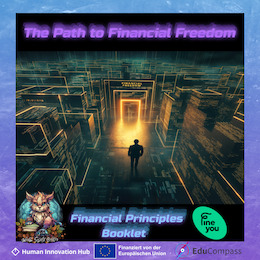Toolbox — For Training and Youth Work
All new tools in your inbox: Be the first to know about new tools for learning with our e-mail notifications.
Manual
The Path to Financial Freedom - Financial Principles
The Path to Financial Freedom is a handbook from the FINEYOU project, teaching 10 key financial principles to support disadvantaged youth, including migrants and NEETs, in building responsible money habits and long-term financial planning.
Aims of the tool
The handbook aims to empower young people—particularly disadvantaged youth, including migrants and NEET groups—with essential financial knowledge and skills. It introduces 10 foundational principles of financial well-being, focusing on responsible financial behavior, saving, smart investing, debt management, and long-term goal setting. Through relatable examples, reflective questions, and practical challenges, the tool encourages users to make informed decisions, build financial resilience, and take active steps toward long-term financial independence and personal development.
Description of the tool
FINEYOU – The Path to Financial Freedom is an interactive educational handbook designed to teach young people, especially those from disadvantaged backgrounds such as migrants and NEET youth, the essentials of financial literacy. Developed as part of the FINEYOU Erasmus+ project, the handbook presents 10 core principles of financial well-being through real-life scenarios, practical advice, and engaging challenges.
Using relatable examples—like the evolving financial journey of a character named Ivo—the tool offers accessible lessons in topics such as budgeting, saving, investing, debt management, and long-term financial planning. Each chapter includes key takeaways, reflective questions, and actionable steps that learners can apply in their daily lives.
The tool is both learner- and educator-friendly, making it ideal for use in youth centers, schools, and informal educational settings. It encourages self-reflection, critical thinking, and responsible decision-making regarding personal finances.
Learning outcomes:
- Grasp 10 key principles of financial well-being.
- Build responsible habits in saving, spending, and budgeting.
- Understand the difference between good and bad debt.
- Learn the basics of investing and risk diversification.
- Set and work toward financial goals, including long-term planning.
- Establish an emergency fund and personal Well-being Fund.
- Recognize emotional influences on financial decisions.
- Gain confidence and independence in managing money.
- Commit to ongoing financial learning and self-improvement.
Available downloads:
Disclaimer
SALTO cannot be held responsible for the inappropriate use of these training tools. Always adapt training tools to your aims, context, target group and to your own skills! These tools have been used in a variety of formats and situations. Please notify SALTO should you know about the origin of or copyright on this tool.
Tool overview

http://toolbox.salto-youth.net/4951
This tool addresses
Social Inclusion, Intercultural Learning, Personal Development, Peer education
Behind the tool
The tool was created by
World Society Builders gGmbH, Edu Compass, Human Innovation Hub
The tool was published to the Toolbox by
Thomas Savvakis (on 18 June 2025)
and last modified
15 June 2025
Comments
No comments have been posted yet.
If you want to comment on this tool, you need to be signed in with your MySALTO account. Sign in now